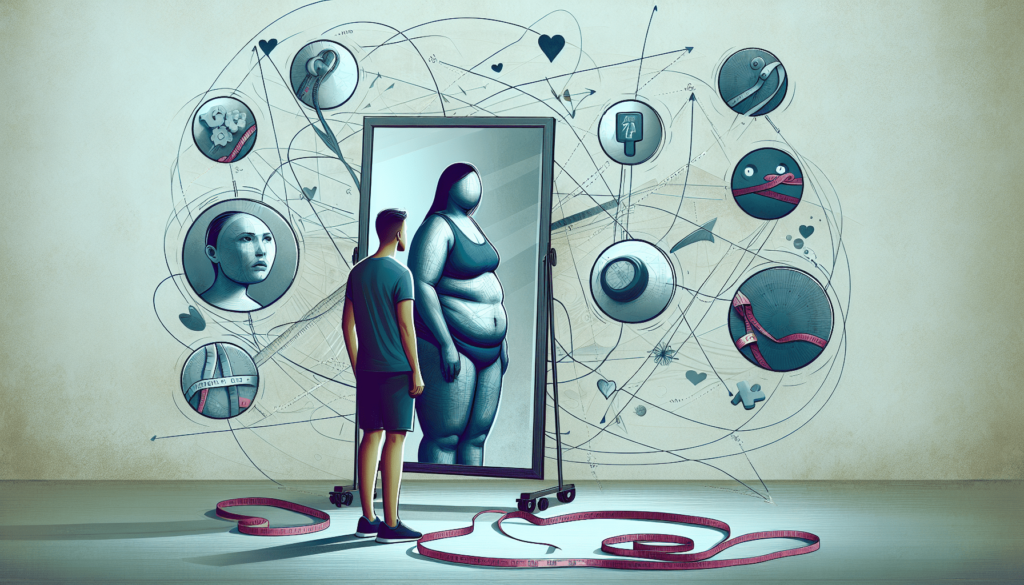Have you ever wondered how your weight can affect your self-esteem? In this article, we explore the intriguing relationship between weight and self-esteem, shedding light on how body image can be influenced by the numbers on the scale. We will delve into the psychological aspect of this connection and provide insights that will help you gain a better understanding of how weight and self-esteem are intertwined. Whether you have struggled with your weight or simply want to expand your knowledge on this topic, this article will provide valuable insights that will leave you with a newfound appreciation for the complex dynamics between weight and self-esteem.
In This Article
ToggleWeight and Self-Esteem
Definition of Self-Esteem
Self-esteem refers to the overall opinion or evaluation an individual has about themselves. It encompasses how you perceive your worth, value, and abilities. It is a subjective assessment that can deeply influence various aspects of your life, including your relationships, achievements, and overall happiness.
Importance of Self-Esteem
Self-esteem plays a crucial role in your emotional well-being and mental health. When you have healthy self-esteem, you have a positive outlook on life, believe in your capabilities, and are resilient in the face of challenges. It acts as a protective shield, enabling you to navigate the ups and downs of life with greater confidence and self-assurance.
Body Image and Self-Esteem
Body image refers to how you perceive and feel about your own physical appearance. It is closely intertwined with self-esteem, as the way you see your body affects your overall sense of self-worth. When your body image aligns with societal ideals, it can enhance your self-esteem. Conversely, if you hold negative beliefs about your body, it can erode your self-esteem and lead to feelings of dissatisfaction and inadequacy.
Perceived Societal Standards
Society often imposes certain ideals and standards of beauty that can heavily influence our perception of ourselves. The media, advertising, and social norms often promote a narrow and unrealistic definition of beauty, emphasizing thinness or muscularity as the epitome of attractiveness. These societal standards can create immense pressure to conform, leading to negative self-perception if one’s body doesn’t align with these ideals.
Cultural Influences on Body Image
Cultural factors also shape the way we view our bodies. Different cultures may have distinct ideals of beauty and body types that are considered desirable. For example, in some cultures, fuller figures may be celebrated and perceived as a symbol of beauty and femininity, while in others, thinness may be highly valued. These cultural norms can further contribute to differences in body satisfaction and self-esteem among individuals.
Factors Influencing the Relationship
Personal Perception
One of the key factors influencing the relationship between weight and self-esteem is personal perception. How you see yourself, both physically and emotionally, can significantly impact your self-esteem. People often engage in self-comparisons and evaluate themselves based on their own internalized standards, which may or may not align with societal expectations. This internal judgment can either positively reinforce self-esteem or contribute to negative body image and lowered self-esteem.
Comments and Criticism
The comments and criticism we receive from others about our weight can have a profound impact on our self-esteem and body image. Negative remarks, teasing, or cruel jokes can be deeply hurtful and contribute to feelings of shame, embarrassment, and reduced self-worth. On the other hand, supportive and constructive feedback can play a positive role in building self-esteem and promoting a healthy body image.
Media Influence
The media, including magazines, television, and social media platforms, often present distorted and idealized images of beauty and bodies. Constant exposure to these images can create unrealistic standards and foster feelings of inadequacy and discontent with one’s own appearance. The pervasive nature of media influence can be particularly detrimental to self-esteem, as individuals often compare themselves to highly edited and manipulated images.
Comparisons to Others
Comparing yourself to others is a natural human tendency. However, when it comes to body image and weight, comparisons can be especially harmful. Engaging in constant comparisons with others’ appearance can lead to feelings of jealousy, dissatisfaction, and a negative self-perception. It is important to recognize that everyone’s body is unique, and focusing on your own personal goals and well-being is more constructive than constantly comparing yourself to others.
Past Experiences and Trauma
Past experiences, including childhood trauma, bullying, or discrimination based on one’s weight, can have a lasting impact on self-esteem. These experiences can shape how one views their body and themselves as a whole. It is crucial to acknowledge the impact of past traumas and seek support to heal and rebuild self-esteem in order to foster a positive body image.

This image is property of images.pexels.com.
Effect of Weight on Self-Esteem
Body Dissatisfaction
Weight can strongly influence an individual’s level of body dissatisfaction. When individuals feel their weight does not align with their desired body, it can lead to dissatisfaction and negative feelings about their appearance. This dissatisfaction may stem from personal preferences or external pressures to conform to societal beauty standards.
Negative Self-Talk
Weight-related self-esteem issues often manifest through negative self-talk. Internal criticism about one’s weight, body shape, or perceived flaws can become habitual, leading to a detrimental impact on self-esteem. Engaging in negative self-talk perpetuates a cycle of self-criticism, reinforcing negative body image and low self-esteem.
Impaired Mental Well-Being
The effect of weight on self-esteem extends beyond physical appearance and can greatly impact mental well-being. Negative body image and low self-esteem can contribute to the development or exacerbation of mental health conditions such as depression, anxiety, and eating disorders. These conditions can further perpetuate the cycle of negative self-perception, highlighting the need for effective intervention and support.
Social Withdrawal
Individuals with low self-esteem related to weight often experience social withdrawal and isolation. Fear of judgment or negative comments about their appearance can lead them to avoid social situations or restrict interactions with others. This social withdrawal can further worsen self-esteem and perpetuate feelings of loneliness and inadequacy.
Low Confidence and Self-Worth
Weight-related self-esteem issues can significantly impact an individual’s confidence and self-worth. They may feel less competent, less deserving of success, or struggle with asserting themselves in various aspects of life. Low self-confidence and self-worth can hinder personal growth, limit opportunities, and hinder the ability to thrive and reach one’s full potential.
The Cycle of Weight and Self-Esteem
Weight Gain and Self-Esteem
Weight gain can have a significant impact on self-esteem, especially if it deviates from societal norms or personal goals. The physical changes associated with weight gain can lead to feelings of self-consciousness, body dissatisfaction, and lowered self-esteem. These negative perceptions may reinforce unhealthy behaviors or coping mechanisms, further contributing to weight gain and a continuing cycle of low self-esteem.
Weight Loss and Self-Esteem
While weight loss is often associated with improved self-esteem, this relationship is not always straightforward. Although achieving weight loss goals can boost confidence and body satisfaction for some individuals, it is important to recognize that weight loss alone does not determine one’s worth or overall self-esteem. Focusing solely on weight as a measure of self-worth can lead to an unhealthy and unsustainable mindset.
Yo-Yo Dieting and Self-Esteem
Yo-yo dieting, or the cyclical pattern of losing and regaining weight, can be detrimental to self-esteem. The repeated cycle of weight fluctuations and body image changes can contribute to feelings of failure, frustration, and low self-esteem. Yo-yo dieters often experience a sense of loss of control and self-blame, perpetuating negative body image and a diminished sense of self-worth.

This image is property of images.pexels.com.
Intervention and Support
Counseling and Therapy
Seeking counseling or therapy can be instrumental in addressing weight-related self-esteem issues. Mental health professionals can provide guidance and support to explore the underlying factors contributing to low self-esteem, challenge negative thought patterns, and develop healthy coping mechanisms. Therapy can also help individuals develop a positive body image, enhance resilience, and cultivate self-acceptance.
Positive Self-Talk and Affirmations
A powerful tool in improving self-esteem is practicing positive self-talk and affirmations. By consciously replacing self-criticism with self-compassion and encouraging self-affirmations, individuals can gradually shift their mindset and cultivate a more positive perception of themselves. Regularly reminding oneself of personal strengths, accomplishments, and intrinsic worth can positively impact self-esteem and foster a healthier body image.
Building a Supportive Network
Surrounding yourself with a supportive network of friends, family, or support groups can be invaluable in building self-esteem. Having individuals who provide encouragement, empathy, and acceptance can create a safe space for personal growth and self-acceptance. Connecting with others who are navigating similar challenges can provide a sense of belonging and increase feelings of self-worth.
Promoting Body Positivity
Embracing body positivity involves rejecting societal beauty standards and celebrating diversity. Promoting body positivity means recognizing that all bodies are unique and that beauty comes in various shapes, sizes, and forms. By challenging harmful societal narratives and promoting inclusive language and representations, we can create a culture that values and respects all bodies, fostering positive body image and self-esteem for individuals of all weights.
Embracing Individuality
Embracing individuality is essential in improving self-esteem. Recognizing that beauty is not limited to one size or shape allows individuals to embrace their unique characteristics and appreciate the qualities that make them who they are. By celebrating individuality, people can cultivate self-acceptance, improve body image, and enhance their overall self-esteem.
Societal Perspectives and Impact
Media’s Role
The media plays a significant role in shaping societal beauty standards and influencing individual perceptions of body image. The constant bombardment of unrealistic, digitally enhanced images can create an unattainable ideal that negatively impacts self-esteem. Promoting media literacy and critical thinking skills can help individuals develop a more discerning eye, challenge harmful representations, and reduce the negative impact of media on self-esteem.
Beauty Standards and their Consequences
The imposition of rigid beauty standards can be detrimental to self-esteem for individuals who do not conform to them. Placing excessive importance on appearance perpetuates a narrow definition of beauty and fosters a culture of comparison and self-objectification. Challenging these standards and recognizing that beauty is subjective allows for a more inclusive and accepting society, promoting positive self-esteem for individuals of all weights.
Body Shaming and Bullying
Body shaming and bullying based on weight can have severe consequences for an individual’s self-esteem. Ignorant comments, teasing, or discrimination contribute to feelings of shame, self-consciousness, and reduced self-worth. Creating a society that rejects and actively combats body shaming and bullying is crucial in fostering a culture of acceptance, respect, and positive self-esteem.
Diverse Representation and Acceptance
Promoting diverse representation in the media, fashion industry, and other platforms can significantly impact self-esteem. By showcasing individuals of different body sizes, shapes, and ethnic backgrounds, society can move toward a more inclusive understanding of beauty. Embracing diverse representation helps individuals see themselves reflected positively in society, fostering a sense of acceptance and promoting healthier self-esteem.
Promoting Health over Appearance
Shifting the emphasis from appearance to overall health is important in improving self-esteem. Encouraging individuals to prioritize their well-being, focus on physical and mental health rather than solely on weight or appearance, helps foster a more balanced and holistic approach to self-care. By promoting health as a multi-dimensional concept, the focus on appearance diminishes, allowing individuals to embrace self-acceptance and maintain a positive body image.

This image is property of images.pexels.com.
Personal Strategies for Building Self-Esteem
Focus on Internal Qualities
Shifting the focus from external appearance to internal qualities can immensely boost self-esteem. Recognizing and valuing personal strengths, talents, and accomplishments allows individuals to build a solid foundation of self-worth. Emphasizing qualities such as kindness, empathy, and resilience brings attention to attributes that are not solely reliant on physical appearance and strengthens overall self-esteem.
Set Realistic Goals
Setting realistic goals is essential in building self-esteem. Unrealistic expectations regarding weight loss or appearance can lead to frustration, disappointment, and diminished self-esteem. By setting achievable and sustainable goals, individuals can experience a sense of accomplishment and build confidence, contributing to a healthier body image and improved self-esteem.
Practice Self-Care
Engaging in self-care activities is key in nurturing self-esteem. Taking care of one’s physical, emotional, and mental well-being helps foster a sense of self-worth and builds resilience. Engaging in activities that bring joy, practicing mindfulness, and prioritizing self-care needs positively impact self-esteem, reinforcing a compassionate and nurturing relationship with oneself.
Surround Yourself with Positivity
Surrounding yourself with positive influences can greatly impact self-esteem. Seeking out supportive relationships, engaging with body-positive content, and avoiding toxic environments or individuals who perpetuate negativity contribute to a healthier self-perception. Creating a positive external environment reinforces self-love, acceptance, and overall well-being.
Challenge Negative Thoughts
Challenging negative thoughts is a powerful strategy in building self-esteem. Paying attention to internal dialogues and replacing self-criticism with self-compassion and positive affirmations helps in reframing negative perceptions. By consciously acknowledging and challenging negative thoughts, individuals can gradually shift their mindset and foster a more positive and uplifting self-perception.
Healthy Weight Management
Health vs. Weight
Shifting the focus from weight to overall health is crucial for cultivating a positive body image and self-esteem. A healthy weight management approach emphasizes adopting habits that promote physical and mental well-being rather than solely focusing on numbers on a scale. Prioritizing nutritious eating, regular physical activity, and stress management contribute to overall health and positively impact self-esteem.
Adopting a Balanced Approach
Adopting a balanced approach to weight management is essential for fostering a positive body image and self-esteem. Extreme or restrictive diets tend to be unsustainable and often lead to yo-yo dieting, damaging self-esteem. Instead, focusing on balanced eating patterns, moderating portion sizes, and embracing intuitive eating can lead to a healthier relationship with food and oneself.
Physical and Emotional Well-Being
Recognizing the importance of physical and emotional well-being in weight management contributes to a more holistic perspective on self-esteem. Engaging in physical activity not only benefits physical health but also releases endorphins, improves mood, and boosts self-confidence. Additionally, prioritizing mental health through stress reduction, practicing self-care, and seeking support when needed plays a significant role in maintaining a positive body image and self-esteem.
Seeking Professional Guidance
Seeking professional guidance is important when embarking on weight management journeys. Consulting with healthcare providers, registered dietitians, or certified fitness professionals helps ensure safe and personalized approaches. Professionals can provide evidence-based recommendations, monitor progress, and offer support, contributing to healthier weight management practices and improved self-esteem.
Emphasizing Overall Lifestyle
Placing emphasis on overall lifestyle rather than weight alone supports healthy self-esteem. Shifting the focus to sustainable habits, such as creating a balanced eating plan, engaging in enjoyable physical activities, and developing healthy coping strategies, leads to long-term well-being. Adopting a mindset that values overall lifestyle choices promotes self-acceptance and helps individuals build a positive relationship with their bodies.

Building Body Positivity
Recognizing Beauty in Diversity
Building body positivity involves recognizing and celebrating beauty in all its diverse forms. Acknowledging that beauty is not confined to certain sizes, shapes, or physical attributes cultivates a more inclusive and accepting perspective. By appreciating diversity and challenging societal beauty norms, individuals can navigate their self-esteem journey with increased self-acceptance and a more positive body image.
Appreciating Your Body
Appreciating and embracing your body is a vital aspect of building body positivity. Focusing on the things your body can do, such as movement, strength, and resilience, rather than solely on appearance is empowering. Expressing gratitude for your body’s uniqueness and recognizing its inherent value contributes to improved body image and heightened self-esteem.
Avoiding Comparison Traps
Avoiding comparison traps is key to cultivating body positivity. Recognizing that everyone’s journey is different and individual progress should not be measured against others’ successes or appearances is crucial. Unplugging from social media accounts or platforms that trigger comparison and focusing on your own growth and self-acceptance fosters a healthier body image and self-esteem.
Practicing Self-Acceptance
Practicing self-acceptance is at the core of building body positivity. Accepting yourself, flaws and all, allows for a more compassionate relationship with your body. This acceptance involves embracing imperfections, being kind to yourself, and letting go of unrealistic expectations. Embracing self-acceptance fuels a positive self-perception and nurtures a sense of self-worth.
Promoting Inclusive Language
Promoting inclusive language is an essential component of building body positivity. Using inclusive language that acknowledges and respects all body types, sizes, and shapes creates a more supportive and accepting environment. This language shift challenges harmful stereotypes and fosters a culture that celebrates diversity, ultimately contributing to improved self-esteem and body image.
Conclusion
The complex relationship between weight and self-esteem highlights the significant impact that body image has on one’s overall well-being. It is crucial to recognize the individual factors, societal influences, and personal experiences that contribute to this relationship. By addressing weight-related self-esteem issues through intervention and support, promoting body diversity and positivity, and emphasizing mental well-being over appearance, individuals can begin to cultivate a positive body image and build a foundation of self-acceptance and self-esteem. Embracing individuality, promoting inclusivity, and focusing on holistic health are key in fostering optimal self-esteem in relation to weight and body image.
Related posts:
 Understanding the Link Between Weight Loss and Eating Disorders
Understanding the Link Between Weight Loss and Eating Disorders
 Empowering Self-Care: 90-Day Weight Loss Journal for Women with Motivational Food & Fitness Tracking
Empowering Self-Care: 90-Day Weight Loss Journal for Women with Motivational Food & Fitness Tracking
 Understanding the Impact of Diabetes on Pregnancy: Mother and Child Concerns
Understanding the Impact of Diabetes on Pregnancy: Mother and Child Concerns
 Understanding Diabetic Neuropathy: The Hidden Danger of Nerve Damage
Understanding Diabetic Neuropathy: The Hidden Danger of Nerve Damage
 Discovering a Long-Term Sustainable Weight Loss Plan
Discovering a Long-Term Sustainable Weight Loss Plan
 Estroven Weight Management: A Natural Solution for Menopause Symptoms and Weight Control – 30 Caplets
Estroven Weight Management: A Natural Solution for Menopause Symptoms and Weight Control – 30 Caplets











No comment yet, add your voice below!